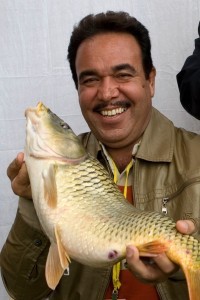
The fish industry in Iraq floundered over the past decade. Farmers were faced with a multitude of problems including disease, the lack of electricity, poor feed quality, lack of water and several economic hardships, such as high operations costs, low prices and transportation issues.
The fish industry had always been a staple for the nation’s economy, but something needed to be done to revive it.
In 2008, USAID-Inma Agribusiness Program began a partnership with Iraq’s largest and best designed hatcheries to help improve carp fingerling production in Iraq. The hatcheries had been operating at less than 20 percent of capacity due to conflict, sanctions and the shortage of water. The hatcheries produced less than 2 million carp fingerlings, which is far below minimum for a country like Iraq.
In order to revive the Iraqi aquaculture industry, USAID-Inma addressed five constraints to fish production and productivity: water aeration, genetic quality of fish stock, appropriate quality fish feed, live haul transport and training. USAID and the Ministry of Agriculture, as well as other organizations, brought improved carp fingerlings from Hungary to Iraq for cross breeding with the native carp species. One of the main benefits was that cross-breeding helped improve the overall health of the fingerlings. Future production of the carp species will be dependent on the cross breeding program with Hungarian brood stock, which are quickly adapting to the Iraqi waters.
Furthermore, USAID-Inma repaired and upgraded the infrastructure of both farms and continues to improve linkages in the fish market value chain.
As a result of the USAID-Inma intervention, the hatcheries produced approximately 180 million fingerlings in 2011 compared to the 12 million in 2008 from the local non-cross bred variety.







Comment
Make a general inquiry or suggest an improvement.